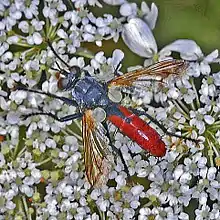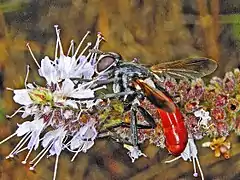Cylindromyia bicolor
Cylindromyia bicolor is a European species of fly in the family Tachinidae.[1][2]
| Cylindromyia bicolor | |
|---|---|
 | |
| Cylindromyia bicolor, dorsal view | |
| Scientific classification | |
| Kingdom: | Animalia |
| Phylum: | Arthropoda |
| Class: | Insecta |
| Order: | Diptera |
| Family: | Tachinidae |
| Subfamily: | Phasiinae |
| Tribe: | Cylindromyiini |
| Genus: | Cylindromyia |
| Species: | C. bicolor |
| Binomial name | |
| Cylindromyia bicolor (Olivier, 1812) | |
| Synonyms | |
| |
Habitat
These insects mainly inhabit dry meadows, bushes, edges of wood, marshes, parks and gardens.[4][5]
Description

Cylindromyia bicolor can reah a length of 11–14 millimetres (0.43–0.55 in). These small flies have a grayish thorax and very elongated, cylindrical red abdomen, with a black longitudinal band at the base and discal bristles at the tergites 2 - 4. The large compound eyes are dark brown. Wings are partly smoked. Calyptra are large and white. Legs are black.[4][5]
Biology
Adults can be found from mid July to October, with a peak in August. They feed on nectar and pollen of flowers of various local plants, but especially on Apiaceae. Larvae of this species are endoparasites of Rhaphigaster nebulosa (Pentatomidae).[4][5][6] The females lay their eggs on their hosts, usually one egg per bug. Then the larvae enter by the abdomen the interior of juvenile pentatomids, where they develop. They pupape on the ground after winter.[7][8]
References
| Wikispecies has information related to Cylindromyia bicolor. |
| Wikimedia Commons has media related to Cylindromyia bicolor. |
- Biolib
- Catalogue of life
- Fauna europaea
- Hans-Peter Tschorsnig and Benno Herting The Tachinids (Diptera: Tachinidae) of Central Europe: Identification Keys for the Species and Data on Distribution and Ecology. State Museum of Natural Science, Stuttgart
- Quel est cet animal?
- Benno Herting A critical revision of host records of Palearctic Tachinidae (Diptera) until 1937 Stuttgarter Beiträge zur Naturkunde
- "Insectoid". Archived from the original on 2018-07-16. Retrieved 2018-02-20.
- Tifa’s Photos